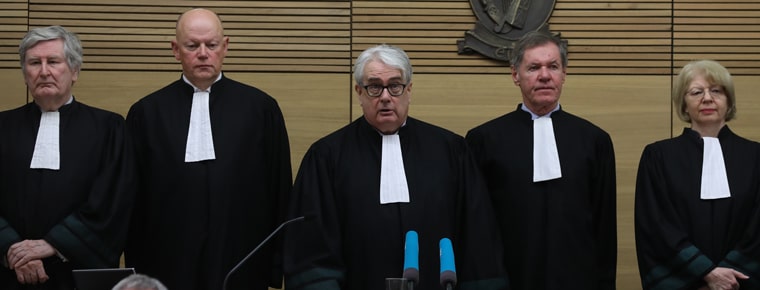 Pic: RollingNews.ie
Pic: RollingNews.ie
Supreme Court refers Dwyer data appeal to CJEU
The majority decision of the Supreme Court in the Dwyer v Commissioner of An Garda Siochána data retention case this morning has been to refer three key issues to the Court of Justice of the EU.
The Graham Dwyer case relates to the retention and accessing of his mobile phone metadata.
The seven judges gave their decision at the first-ever Waterford sitting of the Supreme Court, though one judge, Mr Justice Peter Charleton, dissented.
Far-reaching consequences
Lawyers for the State told the court that the case could have far-reaching consequences for many criminal investigations, prosecutions and convictions.
In December 2018, the High Court ruled that the retention of mobile phone metadata, for access as part of serious crime investigations, breached EU law.
This morning, Chief Justice Frank Clarke expressed a view on three key issues in the case, but because these all involve matters of EU law – and the answers are not clear – he intends to refer these issues directly to the European Court of Justice in Luxembourg.
Specifically, the three issues are:
1) Whether a system of universal retention of certain types of metadata for a fixed period of time is never permissible, irrespective of how robust any regime may be for allowing access to such data,
2) The criteria whereby an assessment can be made about whether any “access regime” to such data can be found to be sufficiently independent and robust. In this instance, the Chief Justice referred directly to an Garda Síochána – and raised the question as to whether its access to metadata without sufficiently independent and robust oversight was in accordance with EU law, and
3) Whether a national court can decide that its national law should not be regarded as having been invalid at all times, particularly in circumstances where it found that national data retention and access legislation was inconsistent with EU law subsequently. In other words, could a national court decide that the “invalidity” of national law could apply only to future cases.
In the above circumstances, the Chief Justice said it was necessary for the Supreme Court to refer the three questions to the CJEU under the provisions of article 267 of the Treaty on the Functioning of the European Union.
Draft
The majority decision of the court agreed that a draft document should be circulated to the parties concerned.
They would then have seven days to make their observations on the draft document being submitted to the CJEU. These observations should be confined “to matters of detail or issues concerning the precise wording of the reference document”, the Chief Justice said.
He concluded: “I would propose that the court, having considered such observations as may be received within that timeframe, should then finalise the reference document and arrange for its transmission to the CJEU.”
Justice minister Charlie Flanagan, commenting on this morning’s judgment, said: “The judgment, as well as the draft preliminary reference from the court, is being examined by my officials, who will do so in conjunction with the Attorney General’s office,” he said.
“I am conscious that this is an area of law where there have been, and there are pending, quite a number of references to the Court of Justice.
Metadata
“It is clear that the current legal framework, allowing for access to communications metadata to combat criminals and terrorists, needs to be modernised in light of evolving jurisprudence.
“The Government has already approved [the] drafting of a revised General Scheme of the Communications (Data Retention and Disclosure) Bill. The bill will replace the Communications (Retention of Data) Act 2011. Drafting of the bill is well advanced and the Department of Justice and Equality is working closely with the Office of Parliamentary Counsel and the Office of the Attorney General on this matter.
“The draft legislation will, of course, need to take account of the outcome of the referral of this case to the CJEU.
“We must be conscious that Mr Dwyer is, in separate legal proceedings, appealing against his conviction and, in those circumstances, of course, it would not be appropriate for me to comment at all on the details of the case,” he said.
The Supreme Court will sit outside Dublin once in every year, the Chief Justice also said this morning at the Court’s first hearing in the city of Waterford, prior to the issuing of the Dwyer judgment
Waterford practitioners are deserving of thanks for so articulately putting forward the case for a visit, he said.
All of Ireland
“We are a Supreme Court for all of Ireland and not just the capital,” Chief Justice Frank Clarke said this morning.
Visits are scheduled for Letterkenny and Castlebar next year, he said.
The Supreme Court is also expanding on its links with secondary school students, in a developing outreach programme.
The sixth edition of the Constitution is now available and was launched in Waterford this morning.
Gazette Desk
Gazette.ie is the daily legal news site of the Law Society of Ireland